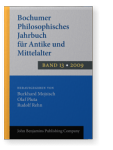The history of the theory of the Platonic ideas in Damascius as an expression of the relation between the One and the Manifold
This paper addresses the relation between the intelligible and the material world in the works of the Neoplatonic philosopher Damascius (ca. 460–ca. 538 AD), who uses the theory of the Platonic Ideas in order to discuss the evolution from the One to the Manifold. This relation arises through specific laws that lead to the development of a harmonious cosmic system. The vertical and the horizontal segmentation of metaphysical causes is implemented in the process of the generation of the empirical world, which is nevertheless imperfect in the sense that it is an image of the metaphysical world and is subject to generation and decay. The metaphysical world constitutes a normative basis for the beings of the world of experience to the same extent in the ontological as in the aesthetic and ethical area. The vertical segmentation cannot be understood without the horizontal because in that case the generation of tangible beings, which are complex realities, would be implausible. At the same time, the horizontal segmentation without the vertical would result in inactive metaphysical causes. The simple fact that the empirical world exists excludes such alternatives.
